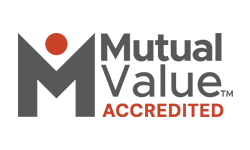G&C Mutual Bank is proud to participate in Scams Awareness Week 2020, which launches today. Scams Awareness Week is part of a national campaign by the Scams Awareness Network, a group of Australian and New Zealand government agencies with responsibility for consumer protection and policing in scams, cyber safety and fraud.
This year’s theme Be yourself. Don’t let a scammer be you focuses on personal information and identity crime and ways in which you can protect your personal and financial information in an increasingly digital environment.
Your personal information is valuable, so scammers will try to steal it. Discussing scams with your family and friends can help protect them, and if you are targeted by a scammer, reporting the scam to Scamwatch can help prevent others from becoming victims.
Scams cost Australians, businesses and the economy hundreds of millions of dollars each year and cause serious emotional harm to victims and their families. In 2019, Australians made more than 167,000 scam reports to Scamwatch. A total loss of more than $142.9 million was reported, a 34 percent increase in losses from 2018.
All scams have the potential for identity theft, and Scams Awareness Week highlights the most common scams such as phishing.
What are phishing scams?
Physical restrictions caused by the COVID-19 (coronavirus) pandemic have resulted in a mass shift towards working, socialising and operating in the digital environment. With more people seeking information and accessing services online, scammers have used the spread of COVID-19 to take advantage of vulnerable people via a variety of phishing scams.
- Scammers try to ‘phish’ for your personal and financial information by impersonating the government, businesses or even your friends.
- A scammer may pretend to have an existing commercial or personal relationship with you or pretend to represent the government. It’s important to stop and determine whether a contact is who they claim to be.
- Phishing scams can occur in the form of text messages, emails, on the internet and via cold calling. Electronic phishing scams contain malicious links and attachments designed to steal your personal and financial information.
- Phishing scams are the most common scams reported to Scamwatch, and many people will come across them in their everyday lives.
How to protect yourself
- Stop and think
- Scammers often try to create a sense of urgency. Don’t rush—think about what the message is telling you to do and consider whether it’s genuine.
- Phishing scams can take the form of fake vouchers or competitions, surveys, postal notifications, bills, account alerts, or they may pretend to offer information. They will always ask you to click on a link, open an attachment or provide your details.
- Don’t give your personal information to unexpected callers or respond to messages and emails asking for your details, even if they claim to be from a reputable organisation or government authority—just delete or hang up.
- Don’t open or click
- Don’t open attachments or click on links in unexpected texts, social media messages, pop-up windows or emails, even if they appear to come from a trusted source.
- Even if you have previously received legitimate text messages from the same number, don’t assume all the messages will be genuine. Scammers can ‘spoof’ real phone numbers or email addresses to make it appear that they are from a legitimate contact.
- Find and verify
- If you are unsure, contact the person, business or agency using contact details you have found independently, for example from a phone book, past bill or online search. Don't use the contact details supplied in the message, email or provided over the phone.
- If you need to check or update an account, such as a bank account, myGov account or any subscription service, log in to your account by typing the web address into your browser or by using a trusted application on your device. Never use the links provided in texts or emails.
Need help?
If you believe someone has gained access to your personal information, even if the scam appears unrelated to your finances, you should contact your bank immediately. A timely response can be critical in giving you the best chance to stem any loss.
- If you have concerns about your G&C Mutual Bank account contact us on 1300 364 400.
- If the scam occurred on social media or a legitimate website, report it to the platform involved. For scams on Facebook, Messenger, WhatsApp and Instagram, see this step-by-step guide for reporting scams on Facebook services.
- You can find out how scams work, how to protect yourself, what to do if you’ve been scammed or report a scam to the Australian Competition and Consumer Commission (ACCC) via the Scamwatch website.




